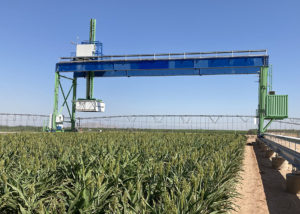 Donald Danforth Plant Science Center Principal Investigator Ivan Baxter is leading a new $16 million multi-institutional project on understanding of water use efficiency in sorghum as a bioenergy crop.
Donald Danforth Plant Science Center Principal Investigator Ivan Baxter is leading a new $16 million multi-institutional project on understanding of water use efficiency in sorghum as a bioenergy crop.
“To be economically viable and have environmental benefits, crops used for bioenergy production need to be grown where the supply of water is insufficient or too inconsistent to support production of traditional food crops,” said Baxter.
 Yields of bioenergy crops, such as Sorghum bicolor, have increased through breeding and improved agronomy. However, the amount of biomass produced for a given amount of water use has remained constant.
Yields of bioenergy crops, such as Sorghum bicolor, have increased through breeding and improved agronomy. However, the amount of biomass produced for a given amount of water use has remained constant.
The multi-institutional team will focus on three major control points of water-limited production: enhanced acquisition of available water by roots, reduced water use through the pores plants use to exchange water and CO2, and improving photosynthetic carbon assimilation. The project will also look at a closely related model plant, Setaria viridis, which is smaller and faster growing to enable rapid testing. In both species, genetics, genomics, and bioinformatics will be used to identify new genes that can affect the control points.

